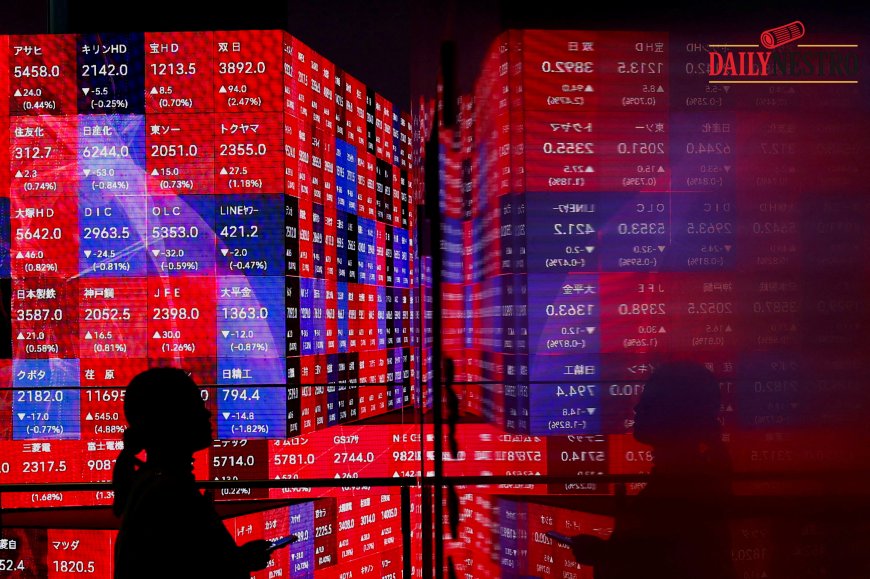Global Tech Meltdown: Valuation Fears Trigger Massive Sell-Off in Asia & US Nasdaq
Tech stocks crash globally on Nov 5, 2025, with the Nikkei and Kospi plummeting over 6%. Discover why investors are abandoning AI hype, what "multiple compression" means, and the surprising opportunity this volatility creates for African startups (Fintech, Logistics).

The technology sector, which has been driving global growth, has encountered a significant setback.
On November 5, 2025, the world’s financial screens were awash in a painful, alarming red. Tech-heavy indices across Asia and the U.S. tumbled under the heavy weight of renewed valuation fears. From the trading floors of Tokyo to the boardrooms of Silicon Valley, investors began asking the same uneasy, market-shaking question: Have we collectively pushed the Artificial Intelligence (AI) dream too far, too fast?
The sell-off began violently. According to Reuters, Japan’s Nikkei 225 plummeted 6.4% in morning trade. South Korea’s Kospi followed with a staggering 7% plunge, erasing nearly $280 billion in market capitalization in mere hours. The fear quickly crossed the Pacific, with U.S. futures turning sharply lower as major Wall Street CEOs began warning the public of a “necessary correction” after two years of relentless, often dizzying gains in AI and semiconductor-related stocks.
Morgan Stanley CEO Ted Pick encapsulated the gravity of the moment: “We’re seeing early signs of multiple compression,” he warned, adding a sobering thought. “Markets may be entering a phase where fundamentals catch up with the hype.”
AI Mania Meets Market Reality
For the better part of 2025, AI was the essential oxygen of the global financial system. Companies responsible for everything from foundational models to cutting-edge chips, including Nvidia, AMD, and Taiwan Semiconductor, saw their valuations skyrocket by double and triple digits as investors priced in a future of seemingly limitless AI domination.
But this frantic pace quickly became unsustainable. As analysts at the Financial Times noted in a recently published piece titled “AI Bubble Worries Spread to Asia,” the sector’s rapid expansion had begun to outpace both earnings growth and real-world commercial adoption critically.
“When forward P/E ratios exceed 50 in multiple markets, history tells us what usually follows,” the FT sternly wrote, dredging up painful memories of the dot-com repricing era.
The contagion started in Asia, where investment is highly sensitive to global trade and supply chain dynamics. Shares of manufacturing giants like TSMC and Samsung Electronics fell by over 8%, dragging down entire national indices. This panic, rooted in the fundamentals of production and export orders from key markets like China, demonstrated that even the most advanced tech companies are not immune to gravitational forces.

Wall Street’s Wake-Up Call: $400 Billion Disappears
Wall Street received its inevitable reality check. The Nasdaq Composite dropped 3.2% in pre-market trading, contributing to an estimated $400 billion market cap loss for the S&P 500 Tech Index within hours.
The immediate trigger was a combination of disappointing earnings from several high-flying, mid-tier AI firms and, critically, the rising Treasury yields mentioned in earlier reports. Higher yields make the lofty valuations of high-growth, high-multiple tech stocks increasingly harder to justify to a demanding market.
Bloomberg Intelligence reports indicate that large hedge funds have quietly been executing a “defensive posturing” strategy, rotating out of large-cap technology and into safer, more stable sectors such as healthcare and utilities. This is a clear signal that institutional money believes a deeper, year-end correction is now a high-probability event.
Global Chill, Local Opportunity: The African Silver Lining
For the African tech ecosystem, this global chill is a complex phenomenon. On the one hand, there is a genuine concern about a decrease in venture capital inflows, as global investors, who are currently experiencing losses, are becoming more cautious and risk-averse, resulting in a retreat from frontier markets.
However, on the other hand, this global correction presents a rare and profound opportunity for local startups to capture a greater share of available capital. As the Western AI frenzy cools and their valuations look frothy, investors start looking for new, comparatively undervalued frontiers that can deliver strong real-world impact and sustainable unit economics. Sectors like fintech, logistics, and agritech across the continent offer precisely this combination.
The comparison with Nigeria's tech leaders is striking. While African companies are often valued on revenue, user growth, and demonstrable financial inclusion impact, global giants were valued almost purely on the promise of AI.
Nigeria's vibrant fintech ecosystem, for example, is valued at over $18 billion, with industry leaders like Flutterwave ($3 billion valuation) and Moniepoint ($1 billion+ valuation) focusing intensely on profitability, cross-border payments, and localized data solutions.
Valuation vs. Reality: Unlike their hyper-valued global counterparts, African tech leaders are often valued at much lower Price-to-Earnings (P/E) or Price-to-Sales (P/S) multiples. The valuations in Africa are closely tethered to solving deep, structural financial access gaps, a fundamental and durable need rather than speculative hype.
The Focus on Revenue: Top African fintechs generate revenue early through transaction fees, merchant services, and lending margins. This focus on clear revenue and cash flow is a compelling advantage for investors suddenly prioritizing returns over pure growth at any cost.
If global capital rotates away from the overhyped Nasdaq and toward emerging markets, Africa could quietly become the next major destination for investors seeking sustainable, high-impact, and comparatively undervalued growth opportunities.
The Maturation of AI
Every powerful bull run in history is followed by a sobering moment, and this might be the one that defines the AI-driven rally.
Crucially, this is not the end of the AI revolution; it is its maturation. As UBS Chief Economist Mark Haefele aptly put it, “The AI revolution isn’t over; it’s maturing. Corrections like these often separate true innovators from speculative hype.”
Long-term investors who were previously hesitant to jump into the highly priced AI wave may soon find much better entry points. More importantly, this event empowers companies with real, tested products and demonstrable revenue, not just compelling PowerPoint promises, to emerge stronger and capture market share while speculative rivals collapse.
For Nigerian entrepreneurs and innovators, the message is clear: the global market is now demanding substance. By focusing on building trusted, resilient, and culturally grounded financial and logistics systems, African companies can prove their models are built on bedrock, not merely digital sand. The volatility in global tech now presents a unique opportunity to position Africa as the hub for financially rational, high-impact digital innovation.
The lesson for the entire financial world is undeniable: even the most powerful digital gold can overheat, and the search for grounded, sustainable value is now back in fashion.
Sources:
ALSO READ MORE ON How Central Banks Hit Pause- But Markets Sense the End of Cheap Money







